GEC publishes new report to shine light on global HIV criminalisation
The Global Equality Caucus has today published a new report, Decriminalising HIV: Strategies and best practice for legislators, which examines how elected representatives can address and reform laws that unfairly criminalise HIV transmission, non-disclosure and exposure.
Over 100 jurisdictions around the world have HIV-specific criminal laws, with many carrying penalties regardless of intent to transmit or whether transmission has occurred. Other countries have applied general criminal laws - including assault and attempted murder - in cases involving people living with HIV, without accounting for modern scientific understanding.
The stigmatising effect of these laws and fear of criminal punishment prevents many people from accessing HIV testing and treatment, which is vital to ending the epidemic. Ultimately it is marginalised communities, who are disproportionately impacted by HIV, that suffer the most from HIV criminalisation.
The report follows a series of virtual roundtables and interviews held with legislators, academics, civil society representatives, and community advocates across every world region.
Informed by this testimony, in addition to global data, international best practice guidelines, and a series of case studies, the report presents 10 Recommendations for legislators working towards the repeal, reform and modernisation of HIV criminal laws.
Andrew Slinn, author of the report, said: “Many of these HIV-specific criminal laws misrepresent HIV and needlessly prolong the epidemic by stigmatising impacted groups. If legislators implement solutions from a public health and human rights perspective, rather than with ineffective criminal penalties, we can end the epidemic by 2030.”
The report will be officially launched at an in-person event in Buenos Aires later today, ahead of the Equal Rights Coalition conference taking place in the city this week.
